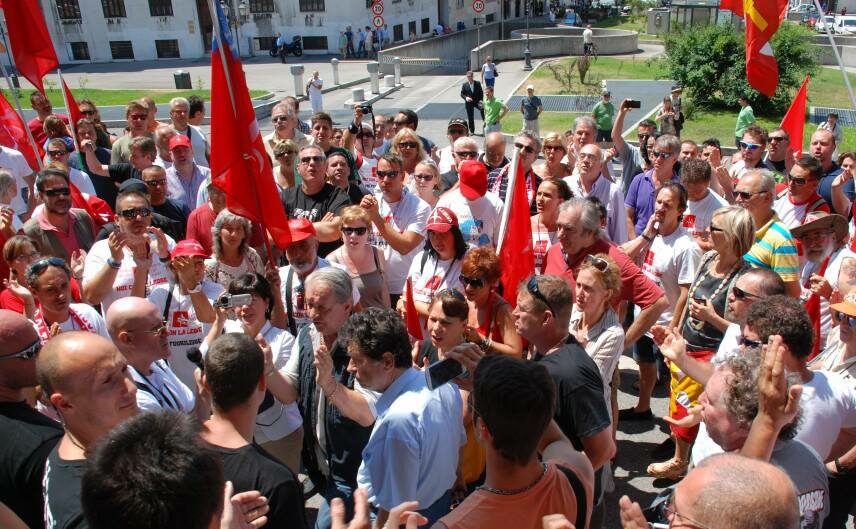
July 17th, 2013: activists and supporters of the Free Trieste Movement standing before the Court of Trieste.
On July 17th, 2013 Free Triesteth’s activists stood before the Court of Trieste. Indeed, a judge should have examined the 1954 MoU regarding the Free Territory of Trieste (the source of its current temporary civil administration) and its implication on jurisdiction.
However, the hearing did not take place, and Judge Tommassini set a new one for 2014.
Unfortunately, local newspaper “Il Piccolo” jumped on the bandwagon, reviving its propaganda against Free Trieste.
This time the newspaper sought an interview with the President of the Criminal Court, Mr. Filippo Gulotta, and used this occasion to put in his mouth more attacks against Free Trieste and its supports.
CASUS BELLI:
The excuse for this further attack was the spontaneous protest of the people in the courtroom, who had come to see the historic hearing about the 1954 Memorandum of Understanding.
Those people were not amused when the hearing was re-scheduled, delayed, and ultimately postponed to 2014. After one and a half year of denials, rejection, excuses, for the first time, the question of Trieste’s jurisdiction was on the table: the 1954 MoU establishes that Trieste does not belong to Italy, thus has its own jurisdiction.
Judge Tommasini did not try to calm the protestors, instead, he requested the Carabinieri to identify them, and immediately started recording them himself.
HERE COMES THE PRESS!
Of course “Il Piccolo” secured an interview with the President of the Court’s criminal section to fuel the fire: on the newspaper, we read that according to Mr. Gulotta “enough is enough” and apparently he requested the police to patrol hearings that involve Free Trieste’s supporters.
Even, we learn from “Il Piccolo” that criminal proceedings may befall on the people who protested during the July 17th hearing, and the lawyer who called Judge Tommassini out for his role in the people’s distress may be sanctioned as well.
FREE TRIESTE’S COMPLAINT:
Free Trieste addressed a note to the administering Italian Government and to the UN:
“the behavior of local magistrates and other Italian officers are unacceptable. They appear as outright provocations, attempts to harshen the ongoing situation instead of settling it, endangering law and order”.
The fact that officers of the administering Italian Government, in breach of their own mandate, trample on the rights of the people of Trieste is very serious.
On the other side, Judge Gulotta is not new to this problem. He himself rejected an exception on jurisdiction for the following reasons:
“…the exception of jurisdiction does manifestly lack legal ground, consequently, also the question as for the constitutionality or lack thereof of the provision regarding Court districts is groundless. No nullity or voidness affects the Public Prosecutor’s actions…
…Considering that exceptions regarding jurisdiction, under the scope of art. 20 of the Italian Code of Criminal Procedure, only require a judgment if the Court upholds the exception, we reject this and all related exceptions, and order that the proceeding continues.” (Source: Proceeding No. 4175/09 R.G.N.R.)
INTERNATIONAL LAW VS LOCAL VIOLATIONS
With this decision, the President of the Criminal Court set the path for his subordinates whenever the people of Trieste sought compliance with the rule of law of Trieste, the State administered by the Italian Government.
This first decision against the law caused more to follow, and this is very destabilizing. People who feel deprived of justice and of their rights, all while the State’s representatives blatantly act against the Law, cannot but fell, well, that “enough really is enough”.
How can a Court declare that an exception on jurisdiction “manifestly lack legal ground” when that ground is the 1947 Treaty of Peace (attached to the exception, even!) which Italy recognizes in its own domestic law?
How is it possible refusing to rule on jurisdiction, when art. 20 of the Italian Code of Criminal Procedure mandates to do so even in case such exceptions are rejected?
Not to mention how most magistrates act before Court. During the aforementioned proceeding, Public Prosecutor Montrone derided the appellant, calling him “folkloristic” and his exception on jurisdiction “nostalgic” because (he says!) the law expires after 60 years. Someone should remind him that the Italian Constitution came into force one year after the 1947 Treaty: does it mean the Italian Constitution is scrap paper now?
Or course, this kind of provocations and the illegitimate rejections are exacerbating tension. The people, derided, intimidated, threatened even on the press, cannot remain at the mercy of the simulators of Italian sovereignty. Their only crime is seeking the re-establishment of the rule of law in their State after all, that State is the Free Territory of Trieste.
Translated from blog “Environment and Legality” by Roberto Giurastante
